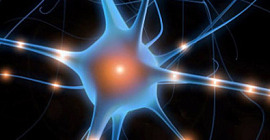A 2-year-old in the study sits on his mother's lap while researchers measure his brain responses to words. Photo courtesy of the University of Washington.
The brain activity of 2-year-olds with autism as they listen to words predicts thinking and language skills up to 4 years later. The finding hints that brain measurements may help to anticipate future abilities in children with autism and allow for early, personalized interventions.
Autism spectrum disorders are a group of related brain conditions that affect about 1 in 88 children nationwide. Children with autism don’t follow typical milestones for social and communication skills. They may avoid eye contact, have trouble with words and language and become preoccupied with certain objects. Because these children can have widely varying outcomes, scientists have been searching for reliable methods to predict a child’s likely developmental path.
Dr. Patricia K. Kuhl of the University of Washington in Seattle has been exploring differences in brain activity between children with and without autism. In earlier work, she and her colleagues found that when preschoolers listened to repetitive syllables, those with autism didn’t show typical brain activity when a new syllable was thrown into the mix. Brain patterns were especially unusual in a subset of kids who had autism along with more severe social impairment.
In the new study, the researchers examined younger children, about 2 years old, to see if brain measurements could identify a similar link between language processing and social abilities. The research was funded in part by NIH’s National Institute of Mental Health (NIMH) and Eunice Kennedy Shriver National Institute of Child Health and Human Development (NICHD). PLOS ONE.
Get The Latest By Email
The scientists studied 24 children with autism. Half of the children had more severe social impairments, according to a standardized assessment, and half less severe. During initial tests, each child wore an elastic cap embedded with 20 sensors that could painlessly detect electrical activity. Brain waves were measured while the children listened to a series of both familiar and unknown words as they sat on a parent’s lap.
Brain responses were similar between a control group of 20 typically developing children and the children with autism who had less severe social symptoms. Both these groups had focused electrical responses to familiar words in a language region on the left side of the brain. The children with autism and more severe social impairment, however, had more diffuse electrical activity on the right side of the brain after hearing known words.
In followup studies 2 and 4 years later, the children with autism were again assessed. The researchers found that the children’s brain activity patterns in response to known words at age 2 predicted their developmental abilities at ages 4 and 6. The group with less social impairments had greater improvements in language skills, thinking and adaptive behaviors compared to the group with more social impairments.
We've shown that the brain’s indicator of word learning in 2-year-olds already diagnosed with autism predicts their eventual skills on a broad set of cognitive and linguistic abilities and adaptive behaviors,” says Kuhl. his line of work may lead to new interventions applied early in development, when the brain shows its highest level of neural plasticity.










